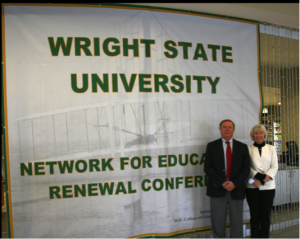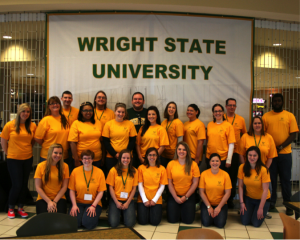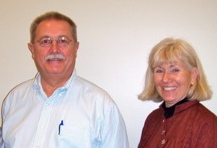John Goodlad, influential educational researcher and teacher whose work over the last sixty years has had a major impact on schools and the education of educators, died on November 29 at his home in Seattle. He was 94.
“John Goodlad offered an alternative vision of what schooling should be,” said David Imig,
“and inspired generations of teachers, principals, academics, politicians, and policy makers to find ways to make good on that vision.” Imig, for thirty years head of the American Association of Colleges for Teacher Education and a long-time-colleague, said that Goodlad “was passionate in his beliefs about the role of schools in a free democratic society.” But coupled with that passion was consideration for his readers and for those he worked with in person. “Goodlad could fill an auditorium with overflow crowds and challenge them to do better for all students. He had the perseverance to shake every congratulatory hand and to engage in conversation with an extraordinary range of adherents, critics, admirers, and detractors, all with civility and respect,” said Imig.
Dr. Goodlad was born in Canada and educated in that country to the level of the master’s degree. He completed his doctorate at the University of Chicago and held twenty honorary doctorates from colleges and universities in the United States and Canada. He taught at all grade levels and in a variety of institutions, including a one-room, eight-grade rural school in Canada. Following professorships and administrative positions at Agnes Scott and Emory University in Georgia, and the University of Chicago, Dr. Goodlad was professor at the University of California at Los Angeles, where he served as dean of the Graduate School of Education for sixteen years.
William Gerberding, former executive vice chancellor at UCLA, and former president of the University of Washington, recalls the impact Dr. Goodlad had at both institutions. With Goodlad’s coming to UCLA, Gerberding said, one could feel “the excitement attached to the arrival of this already well known, even glamorous, young star as dean. I was lucky enough to know and admire him as a colleague.” Under Goodlad’s direction, the UCLA Graduate School of Education became one of the top-ranked schools in the nation.
In 1984, five years after Gerberding became president of the University of Washington, Goodlad also came north. Gerberding recalls that Goodlad “decided to accept an offer from the UW to teach and do research. He had been for many years one of the big names in his field; he added luster to our College of Education and University.” At the UW, Dr. Goodlad created the Center for Educational Renewal to conduct research on teacher education and school renewal. He also created the independent Seattle-based Institute for Educational Inquiry in 1992 to apply research findings to school practice and to conduct educational leadership training programs.
Dr. Goodlad authored, co-authored, or edited over three dozen books. He wrote chapters in more than one hundred other books, and published more than two hundred articles in professional journals and encyclopedias. His work attracted international interest; some of his books have been translated into such languages as Japanese, Chinese, French, Italian, Spanish, and Hebrew.
Dr. Goodlad was perhaps best known for his four-year study of schools, considered by many observers to be “the most extensive on-site examination of U.S. schools ever undertaken.” The study resulted in his 1984 publication, A Place Called School, which received the Outstanding Book of the Year Award from the American Educational Research Association and Distinguished Book of the Year Award from Kappa Delta Pi.
Dr. Goodlad and colleagues subsequently conducted a major five-year study of teacher education, resulting in five books, including Goodlad’s summary volume, Teachers for Our Nation’s Schools, which won the Outstanding Writing Award from the American Association of Colleges for Teacher Education in 1990. Albert Shanker, President of the American Federation of Teachers, called Goodlad’s book “teacher education’s Flexner Report,” in reference to Abraham Flexner’s 1910 ground-breaking report on medical schools. In 1986, Goodlad subsequently created a national network of schools and universities focusing on the simultaneous improvement of schools and teacher education. The network today includes some 27 colleges and universities and 160 school districts.
A substantial portion of Dr. Goodlad’s work was supported by the ExxonMobil Foundation over a 16-year period. Ed Ahnert, retired president of the foundation, noted that Dr. Goodlad “was an intellectual giant, towering over the history, philosophy, and practice of both collegiate and elementary/secondary education for half a century. He had love for his students and colleagues, mastery of his field, the courage to speak truth to power, and integrity. He understood the noble link between education as politics as clearly as 4th Century BCE Greeks and the Enlightenment philosophers. At the same time, he was outraged by the sordid self-interested antics of most education policy makers and empire builders.”
In addition to academic administration, Dr. Goodlad held many leadership roles. He was president of the American Association of Colleges for Teacher Education, president of the American Educational Research Association, and charter member of the National Academy of Education.
Dr. Goodlad’s research and scholarship was recognized in 1993 with the American Educational Research Association Award for Distinguished Contributions to Educational Research. In 1999, he was a recipient of Conant Award for Outstanding Service to Education from the Education Commission of the States; in 2002, he received the first Brock International Prize in Education; in 2003, he received the New York Academy of Public Education Medal. In 2004, he received the American Education Award from the American Association of School Administrators; and in 2005, he received the Association of Teacher Educators Distinguished Educator Award. In 2009, he received the Outstanding Friend of Public Education from the Horace Mann League and the Outstanding Achievement Award from the John Dewey Society.
Dr. Goodlad’s research and teaching focused in part on curriculum and the “hows” of school teaching and management. But there was always a deeper issue. Teaching is an ethical act, Dr. Goodlad argued, and a critical part of being ethical is having a good sense of who you are. A colleague, James March at Stanford University, said that Goodlad had for many years been “trying to embrace not education as an instrument of individual or social well-being, but as a testament, temple, and calling. And as much as anyone, Goodlad has taught us to ask whether we know who we are.”
Dr. Goodlad is survived by a daughter, Paula; a son, Stephen, and five grandsons.
For more information: Roger Soder, President,
Institute for Educational Inquiry, Seattle
206.789.7515
rsoder@u.washington.edu





